Lea Wait's Blog, page 59
July 27, 2023
The Evolution of a Book by Matt Cost
The evolution of a book is a complicated journey through time that takes many a turn and twist but at the same time follows a basic model. Mainely Wicked, the fifth book in my Mainely Mystery series set in Brunswick, will publish on August 9th, and these are the phases that it passed through in its evolution.
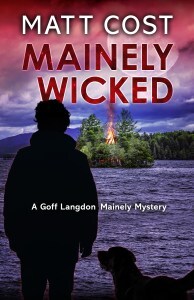
It starts with an idea. What is the book going to be about? Often, for me, this is something gleaned from the news or something that I have read. What if there were a problem at a nuclear power plant? What if heroin was being smuggled through lobster traps? These ideas can range from cults to ice storms to genome editing to powerful lobbyists to unexplained aerial phenomena to an epidemic. Or, in the case of Mainely Wicked, how scary are the modern dating sites?
Most recently, my idea germinated with the thought that I wanted to combine my love of history and mystery between the front and back cover of a novel. I decided that I wanted to write a historical PI mystery set in the past. Where? I decided that Brooklyn, New York, was a fabulous place to set this novel. It didn’t take me much longer to realize that the Roaring ‘20s was absolutely great fodder that was rich in material.
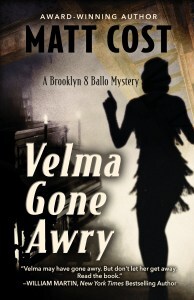
Thus, the idea was born to write Velma Gone Awry set in 1923 Brooklyn. A young flapper disappears and her wealthy father hires PI 8 Ballo to find her. A simple story that gets more and more complicated page by page.
Once the idea is generated, the next step is to begin the research. Straight up historical fiction requires a great deal of delving into the topic at hand, whether it be about Fidel Castro and the Cuban Revolution, Joshua Chamberlain and the Civil War, or New Orleans during the period of Reconstruction. To me, this is fascinating material that is exhilarating to dive into and toss around and learn more about. I have taken this love of digging into topics with my contemporary mysteries on the above-mentioned topics. Nuclear power, Big Pharma, Scientology, and what is in the sky above us?
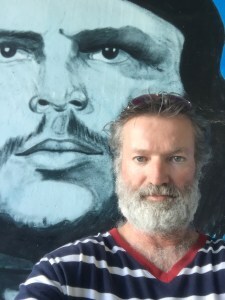
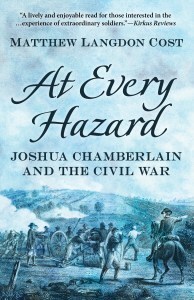
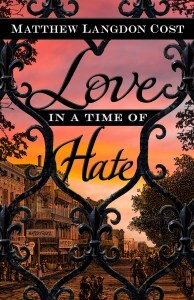
For Velma Gone Awry, it was a mixture of these two ideas; getting the time period correct regarding people, events, slang, as well as the topics of the day. The most fascinating research method that I used to accomplish this was to read the Brooklyn Eagle for every day for the entire year of 1923. Just 100 years later. The articles, events, and listings for what was happening were are all great information, but it was the advertisements for everything from automobiles to fashion that was perhaps the greatest contributor to this research.
And then you write. I write every day. Sometimes just a bit, often more, and occasionally the words will spill from my keyboard like the rain in Vermont from a couple of weeks ago.

I also keep an outline where I will fill out tidbits of thoughts that will happen at certain times in the book. My basic philosophy is that something substantial must happen every 12.5% of the book. I shoot for 80,000 words on the first draft, knowing I will add another eight thousand with edits, so every ten thousand words something has to go down. Shit must happen.
As I write, I continue to constantly do research, especially in a historical such as Velma Gone Awry where I need to fit appropriate slang in, fact check that refrigerators existed, or some other factoid of the time. Often, my best writing times are taking a solitary hot tub, walking the dogs, or driving. This is when I put the pieces together for the next segment of writing, so that when I sit down at the computer, it is a race to see if it can keep up with my fingers. I haven’t won yet.
The editing phase can be a frustrating exercise in painting the exterior trim to make the novel shine. The stages of editing for me include at least two passes of my own, three by a professional editor I pay, and then at least two more by the publisher. In my upcoming book, Mainely Wicked, my wife, after those seven edits had been done, found a major mistake in the ARC. A character who had been abducted was present for the planning session on how to saver herself. Whoops. Glad it was caught.

The book is done. Now it must be marketed. ARCs sent out for review, queries for interview, guest blog appearances, podcasts, radio, and most recently for me, Tubi TV (whatever that is). This is followed by promotions. The appearance of the author at events such as bookstore signings, readings, library presentations, and the culmination of that groundwork preparing for interviews in all sorts of various mediums.
The evolution of a book passes through the stages of idea, research, writing, editing, marketing, and promoting. And then what do we do? Write on.

About the Author
Matt Cost was a history major at Trinity College. He owned a mystery bookstore, a video store, and a gym, before serving a ten-year sentence as a junior high school teacher. In 2014 he was released and began writing. And that’s what he does. He writes histories and mysteries.
Cost has published four books in the Mainely Mystery series, with the fifth, Mainely Wicked, due out in August of 2023. He has also published four books in the Clay Wolfe Trap series, with the fifth, Pirate Trap, due out in December of 2023.
For historical novels, Cost has published At Every Hazard and its sequel, Love in a Time of Hate, as well as I am Cuba. In April of 2023, Cost combined his love of histories and mysteries into a historical PI mystery set in 1923 Brooklyn, Velma Gone Awry.
Cost now lives in Brunswick, Maine, with his wife, Harper. There are four grown children: Brittany, Pearson, Miranda, and Ryan. A chocolate Lab and a basset hound round out the mix. He now spends his days at the computer, writing.
July 25, 2023
Summer Sunsets
There haven’t been a lot of good sunsets this summer. Too much fog and rain. But when we do see one, it is often spectacular. So for your enjoyment today (and perhaps to create a longing to be in Maine if you aren’t already here) we offer sunsets from the soft and gentle to great blazes of glory.

























July 24, 2023
Hot Books
Charlene D’Avanzo: This year we earthlings have witnessed shocking changes in our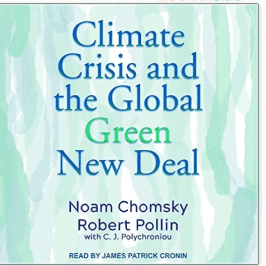 climate – devastating floods in South Asia, record-breaking heat waves in Europe and
climate – devastating floods in South Asia, record-breaking heat waves in Europe and
India, unprecedented wildfires across the planet. Unfortunately we now know what
“climate is everything” actually means – that it impacts all of us, everywhere.
Annually EARTH-ORG posts that year’s Best Climate Books To Read. Below are several from their 2022 and 2023 lists that I especially recommend.
The New Climate War, by Michael Mann. Climate Superhero Michael Mann published his now-famous ‘hockey stick’ graph in 1999 showing our impact on average temperature rise. Attacked and dismissed by the fossil fuel industry, Mann never gave up and pushed for the emerging field of climate science to be recognized. Described as a fascinating untangling of the intricate web of misinformation, misdirection and deflection perpetuated by the fossil fuel industry since climate change became an incontrovertible reality in the book Mann, cautiously optimistic,
argues that we have the technical and or intellectual inability to achieve systemic change. What we lack is the political needed to do so.
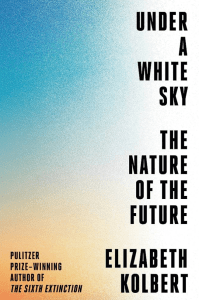 Under A White Sky, by Elizabeth Kolbert is described as “immensely readable, vividly describing everything from the flooding marshlands of Louisiana to the mind-bogglingly exciting developments in genetic engineering” – latest technological fixes underway that might or might not work.
Under A White Sky, by Elizabeth Kolbert is described as “immensely readable, vividly describing everything from the flooding marshlands of Louisiana to the mind-bogglingly exciting developments in genetic engineering” – latest technological fixes underway that might or might not work.
Climate Crisis and the Global Green New Deal: The Political Economy of Saving the Planet by Noam Chomsky & Robert Pollin. Two intellectual and progressive economists lay out catastrophic consequences of warming and a realistic blueprint for change they call the Green New Deal.
The Climate Book by Greta Thunberg. The famous climate activist features essays by over a hundred experts – from oceanographers and meteorologists to economists and geophysicists – who show us what we need to know fight disasters and halt warming.
I end with a plug for my own books including Cold Blood, Hot Sea that feature climate change warming understories.

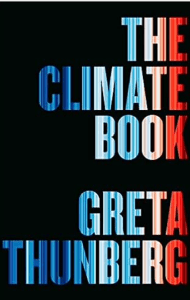
July 21, 2023
Weekend Update: July 22-23, 2023
 Next week at Maine Crime Writers there will be posts by Charlene D’Avanzo (Monday), Maureen Milliken (Tuesday) Matt Cost (Thursday), and Kait Carson (Friday).
Next week at Maine Crime Writers there will be posts by Charlene D’Avanzo (Monday), Maureen Milliken (Tuesday) Matt Cost (Thursday), and Kait Carson (Friday).
In the news department, here’s what’s happening with some of us who blog regularly at Maine Crime Writers:
Matt Cost will be signing books at Shermans Maine Coast Bookshop in Portland on July 29th from 1-3 p.m. He is looking forward to the August 9th release of Mainely Wicked, the fifth book in his Goff Langdon Mainely Mystery series set in Brunswick. Stay tuned for details on a special pre-release book launch coming in early August.
An invitation to readers of this blog: Do you have news relating to Maine, Crime, or Writing? We’d love to hear from you. Just comment below to share.
And a reminder: If your library, school, or organization is looking for a speaker, we are often available to talk about the writing process, research, where we get our ideas, and other mysteries of the business, along with the very popular “Making a Mystery” with audience participation, and “Casting Call: How We Staff Our Mysteries.” We also do programs on Zoom. Contact Kate Flora
July 20, 2023
Give me the Cake, with Frosting
In the (and temporary, I hope) brain-stunned state I find myself in after finishing a draft of my current novel—an Elder Darrow, if you’ve been pining for news—I’m forcing myself not to think about it for at least a month, or failing that, another day or two.
I try not to complain about the writing—nobody’s asking me to do it and it’s not like I’m making my living from it—but as my brain pan slowly refills and I’m shaking off the memory of those grinding mornings, I’m wondering (and again, temporarily, I hope) why the hell we do it.
And I come back to Annie Dillard, who had the most intelligent response I’ve heard to a question from one of her students as to whether Dillard thought he could be a writer.
“I don’t know,” she said. “Do you like sentences?”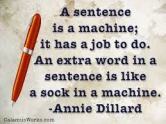
If you pay attention to social media, you might think that writers spend all their time when they’re not writing, hustling their books, their public appearances, and their connections. I think of all that as a sideline, an unfortunate (at least for the introverted among us) byproduct of publishing your work and finding its readers.
Obviously, the largest number of us do not do this for the money which, even when it appears, is fickle and insufficient. And I think of contests, prizes, and panel appearances at conferences as frosting. Good for the flavor, but it is possible to mistake the frosting for the cake.
So if it isn’t the money and it isn’t the notoriety? Why?
For me, it does come down to, yes, the sentences, and the words, that occasional but deeply seductive moment when what you want to say and what you do say mesh like the fine gears of an intricate machine, when the pieces of a plot click into place. Oh yes, and the pens. And the Rhodia pads.  And the physical act of writing, the hand moving across the page.
And the physical act of writing, the hand moving across the page.
You get to judge what means success to you: your sales, your publication history, how close you come to saying exactly what you wanted to say. Or all of the above.
Writing, especially for publication, is a strange enough seeking, but then there are people in the world who hit little white balls with a stick or try to fool a fish with a brain the size of a peppercorn with a bit of fluff and feathers.
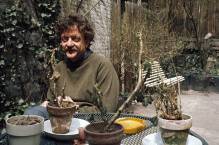
In the immortal words of Kurt Vonnegut, “We’re in the world to fart around.” I can’t argue with that. The most sensible view of why we write may be that it is our own personal form of farting around. That’s good enough for me, and maybe we don’t need to be any more serious about it than that. I’ll be the one sitting over here, slightly cranky and slightly aloof, hoping you love my books.
July 19, 2023
“Lumpy, Aged, and Wrinkled Bodies”
Sandra Neily here:
Today, I want to explore (just a bit) how an author might write about age. Not just write about it, but actually write age. I was motivated by a very recent post, “Never Too Late?” (Thanks, Maggie Robinson!)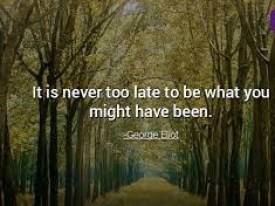
I found lots of authors who paused in the story to have a character give us some aging philosophy—as if from on high. Nope, not what works well I thought. Breaks the story, the tone, the plot’s trajectory.
So I went back to the Pulitzer Prize winning Olive Kitteridge, Elizabeth’s Strout’s first Olive novel.
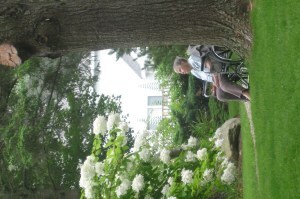
My mother after my father had gone …..
The novel still stuns me, but the first jolt happened many years ago when I read Olive’s lines about loneliness after her husband’s death. For the first time, I understood why my mother, alone after a long marriage, drove daily to the ocean to sit and stare at the water. With tears, I could feel her loneliness because of Olive’s loneliness.
I was so sad that I had not met Olive before my mother died so I could sit in the car with both of them. Not talk much, perhaps. But just be there.
That’s an author bringing you inside in a very intimate way as Strout also does in these lines from the novel. It’s Olive’s voice though (“what pieces life took out of you”). The author does not intrude.
(The lines are also a master class on how to craft an extended metaphor that only gains power as it grows. Oh my.)
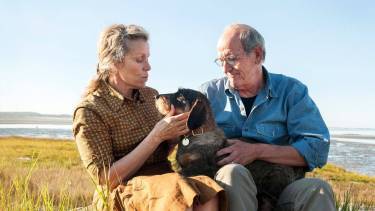
A still from the Live Kitteridge mini-series
“What young people didn’t know, she thought, lying down beside this man, his hand on her shoulder, her arm; oh, what young people did not know. They did not know that lumpy, aged, and wrinkled bodies were as needy as their own young, firm ones, that love was not to be tossed away carelessly, as if it were a tart on a platter with others that got passed around again. No, if love was available, one chose it, or didn’t choose it. And if her platter had been full with the goodness of Henry and she had found it burdensome, had flicked it off crumbs at a time, it was because she had not known what one should know: that day after day was unconsciously squandered.
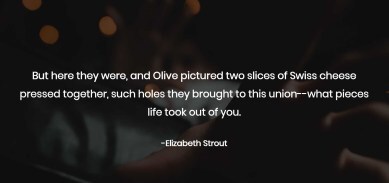 And so, if this man next to her now was not a man she would have chosen before this time, what did it matter? He most likely wouldn’t have chosen her either. But here they were, and Olive pictured two slices of Swiss cheese pressed together, such holes they brought to this union—what pieces life took out of you. Her eyes were closed, and throughout her tired self swept waves of gratitude—and regret. She pictured the sunny room, the sun-washed wall, the bayberry outside. It baffled her, the world. She did not want to leave it yet. …”
And so, if this man next to her now was not a man she would have chosen before this time, what did it matter? He most likely wouldn’t have chosen her either. But here they were, and Olive pictured two slices of Swiss cheese pressed together, such holes they brought to this union—what pieces life took out of you. Her eyes were closed, and throughout her tired self swept waves of gratitude—and regret. She pictured the sunny room, the sun-washed wall, the bayberry outside. It baffled her, the world. She did not want to leave it yet. …”
From Elizabeth Strout’s Olive Kitteridge
(Here’s the trailer from the Emmy-winning mini-series with Francis McDormand.)
I will be seventy-four in a few days.

senior photo strategies: sister Joy always turns her back
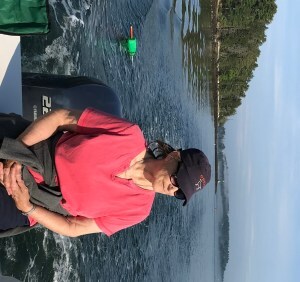
I use baseball caps
I was hesitant to write age issues into my novels until a teacher said I was “holding back,” that I was not going where the pain was—that I had to write pain I intimately knew and enrich characters with it so they might be real as well. “Bring the pain,” she said. “Bring the kind you feel.”
So I worked on writing age, not writing about age, but writing age in ways that felt especially familiar yet also creative—in ways that moved the story forward. I’ll admit that giving familiar pain to my characters was a bit cathartic.
From Deadly Trespass:
My fingers had terrified my husband. When I reached for Evan across the sheets, I could almost feel his private parts freeze under the covers.
“There’s an arthritis treatment that restores your hands to what they were, right?” he’d asked, rolling away and offering me his back.
In the dark, I struggled with my wedding ring. I spent the night in the bathroom, greasing my finger until the ring pinged musically to the tile floor. Nothing was going to restore the marriage, not after he’d welcomed smooth hands under different sheets.
*****
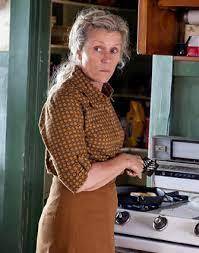
Another still from the Olive Kitteridge mini-series
I looked down and tried to see myself as Chan saw me. I wore an old paint-stained shirt with sleeves cut off at the elbows and Baptist Thrift Store pants so soft and ancient they were like wearing air. My hiking boots look attacked by jellyfish because I’d patched worn spots with globs of Aquaseal.
My pony tail had no gray hairs because Cousin Liz treated me to appointments that returned my blond highlights. “You should not,” she said, “resemble old moss on old trees.” My face had forehead worry lines. My lips had enough wrinkles to give up on lipstick. I’d never liked lipstick anyway.
If I hid my arthritis-bent fingers, I could be anywhere from age fifty to sixty. I didn’t think young people guessed our ages after forty. We were a foreign country.
*****
At camp, she led me to their equipment tent, where she’d spread my sleeping bag and Pock’s foam pad between crates and more jars of peanut butter. “Of course you don’t want to share a tent with the lad,” she said. “If you’re like me, you spend half the night mopping up.”
How did she know I dreaded a night sweating next to Ian? She undressed and slid her folded clothes into a crate, her cream-colored buttocks shining like twin moons. Naked, she pulled a wool hat over her hair and blew out the sputtering candles. “If women could connect batteries to hot flashes, we might light the earth. Don’t forget to leave clothes in with mine. It’s bear time, too. Hunters running dogs make the bruins a touch crazy.” She waved a few fingers at me and zipped her tent.
*****
From Deadly Turn
The forest looked raw and naked. I knew that when blood stopped flowing into the weight of what male moose carried around,  their antlers toppled off, but I’d never stood in a field of antlers.
their antlers toppled off, but I’d never stood in a field of antlers.
Some were snagged in low, leafless branches. It looked like sculptors had entwined angular bones and twisted tree limbs as a wilderness commentary on arthritis. A few yards away from a snagged antler, I held up my hands, closed one eye, and saw how my gnarled fingers neatly fit into this artistic vision.
*****
Of course my dog was up to no good up on Eagle Ridge. “Texas,” I panted. “Could use Texas right about now. Or Oklahoma.” On a flat plain, I could have dashed from wind tower to wind tower, maybe dodging cows, but in Maine’s north woods we all have to go up, up, up.
I dropped my pack and hard hat, tightened the band holding my pony tail, and tried to jog up the road. Nothing had changed since the last time I’d asked my knees to challenge elevations. Since I’d turned fifty, they just complained.
******
I could run if I had to. Arthritis paired with extra pounds isn’t a terminal disease. I was in the move-it-or-lose-it time of life when butts grow into soft cushions that fit couches. It felt good to have an excuse to run. I aimed for where I’d seen Pock take flight and found a grove of birch thinned by fire. I jumped black stumps and twisted around white trunks. My passing lifted sheets of loose bark that waved like a scattered cheering section.
******
I slid off the swing to stand facing Dan’s chest. I thumped it a bit with my most crooked, witch-ugly finger. Dan grimaced and backed away. I’d never thought of weaponizing arthritis, but there was always a first time and I had very ugly fingers. “Someone else local and not me will have to show up at the hearing to testify.” I poked Dan again.
From the working draft of Deadly Assault:

yellow birch
My first trip to the tree stand, lugging radio surveillance telemetry, night vision binoculars, and spotting scopes, I struggled to keep up and almost collided with the tree. The giant, yellow birch had gnarled, sideways limbs. “It’s all twisted and tortured,” I said.
Ken patted the trunk and unclipped a mess of cables connected to the birch’s upper branches. “Yup. Kind of like some of your fingers.” He chuckled and pulled my hands out of my pockets. “Now don’t hide ‘em. Your gnarled ones might tell the same story as the tree. Some tortured life there, too, I expect.”
Rubbing my fingers to return circulation, I was pretty sure trees didn’t get arthritis, but I said nothing.
*****
Dr. Teague had closed my computer file and swiveled her chair toward me. “Recovery depends on all the systems that have suffered damage regaining their connection to health.”
“Do people my age come back?” I asked.
“Mid-fifties or so?” she asked? “You arrived in good shape. That matters. Someday this process of making someone seriously ill simply to restore health will look like something cavemen dreamed up. Chemo can kill cancer cells, but, as you now know, it often compromises fast growing cells elsewhere in your body. There could be some loss. You’ll have to wait and see.”
*****
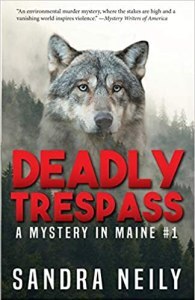 Sandy’s debut novel, “Deadly Trespass, A Mystery in Maine” won a national Mystery Writers of America award, was a finalist in the Women’s Fiction Writers Association “Rising Star” contest, and was a finalist for a Maine Literary Award. The second Mystery in Maine, “Deadly Turn,” was published in 2021. Her third “Deadly” is due out in 2023. Find her novels at all Shermans Books (Maine) and on Amazon. Find more info on Sandy’s website.
Sandy’s debut novel, “Deadly Trespass, A Mystery in Maine” won a national Mystery Writers of America award, was a finalist in the Women’s Fiction Writers Association “Rising Star” contest, and was a finalist for a Maine Literary Award. The second Mystery in Maine, “Deadly Turn,” was published in 2021. Her third “Deadly” is due out in 2023. Find her novels at all Shermans Books (Maine) and on Amazon. Find more info on Sandy’s website.
Sighing in the Rain
Kate Flora: Summer 2023. Canadian smoke. Day after day of pouring rain. Fog that 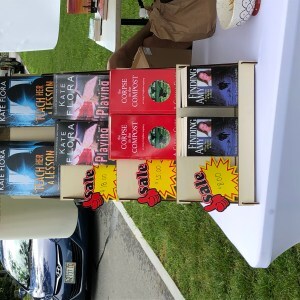 comes and goes and comes and goes. A flock of six large turkeys who strut through the yard or suddenly fly up into trees sounding like 747s. A rampaging horde of slugs eating all of the colorful annuals I’ve planted in pots. This is definitely weather to inspire homicidal impulses. But wait. Aren’t those exactly the impulses a crime writer should have?
comes and goes and comes and goes. A flock of six large turkeys who strut through the yard or suddenly fly up into trees sounding like 747s. A rampaging horde of slugs eating all of the colorful annuals I’ve planted in pots. This is definitely weather to inspire homicidal impulses. But wait. Aren’t those exactly the impulses a crime writer should have?
I’ve often blogged about how one advantage of being a writer is that we can take all the things that happen to us–good and bad, but especially bad–and channel the feelings they inspire into our work. Annoyed at the driver who brakes at every curve and slows when going uphill as though all their blood had drained from their foot? Give the angry impulses such behavior inspires to a character.
Frustrated by the woman before you at the checkout who only starts looking for her credit card when all her purchases are bagged and back in her cart? Imagine her being skewered in an interview with your tough detective. Or the one who wants to argue about being overcharged by ten cents? These people are gifts given to us so we’ll have more peripheral characters for our books.
It’s not all bad, of course. People can be funny and inspiring. The other night, while Maureen Milliken and I were flogging our wares at Brunswick’s Second Friday, many marvelous people came by. The tall, imposing woman who’d just moved to Maine approached our table like we were a treat and eagerly bought books. There was a charming young girl, too young to read our books, who confessed that she was a playwright. We got to welcome so many people who had just moved to Maine and who were so happy to be out enjoying a beautiful evening. (Beautiful evenings this summer have been far too rare.)
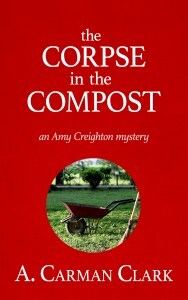 I’ve had a lot of fun pitching my mother’s second book, The Corpse in the Compost, which she wrote when she was in her eighties.
I’ve had a lot of fun pitching my mother’s second book, The Corpse in the Compost, which she wrote when she was in her eighties.
So yes, I’ve been sighing in the rain as my garden is flattened and the few things still standing are being eaten by a small red bug I’ve never seen before. And of course I can channel that gloom into Joe Burgess, who is rather a grump fellow. I can also remind myself that since I can’t be outside working, I should be at my desk writing. But then you remind me, if you’re following this blog, that I am supposed to be taking the summer off. Oh. Right. So I should change the title above to: Reading in the Rain.
Not outside, of course.
I’ve been loading my kindle with books. Downloading audio books to listen to in the car. My husband and I just finished The Once and Future King and now we are on the fourth Mick Herron Slough House book. The plots may plod along and be a bit thin at times but his use of language is so marvelous I am green with envy. Unless that’s mildew from all the rain?
 So writing. Reading. Fog watching. What else? Well, summer in Maine means guests. And guest means reading cooking blogs and cookbooks to find interesting things to cook. This weekend’s greatest hit was a corn, farro, and coconut milk dish topped with fried onions. https://www.bonappetit.com/recipe/creamed-corn-and-grains Next week I am looking forward to trying some salads from Deb Perlman’s Smitten Kitchen. https://smittenkitchen.com The strawberry jam is made and at the end of the month we will have a family blueberry picking day in my field and there will be more jam. Plus pie. Plus probably a number of other desserts from the Union Fair Blueberry Festival recipe brochure my mother wrote many years ago.
So writing. Reading. Fog watching. What else? Well, summer in Maine means guests. And guest means reading cooking blogs and cookbooks to find interesting things to cook. This weekend’s greatest hit was a corn, farro, and coconut milk dish topped with fried onions. https://www.bonappetit.com/recipe/creamed-corn-and-grains Next week I am looking forward to trying some salads from Deb Perlman’s Smitten Kitchen. https://smittenkitchen.com The strawberry jam is made and at the end of the month we will have a family blueberry picking day in my field and there will be more jam. Plus pie. Plus probably a number of other desserts from the Union Fair Blueberry Festival recipe brochure my mother wrote many years ago.
How do you spend your summers? Are you gardeners? Hikers? Boaters? Campers? And what are the books in your TBR pile? Anything that you are telling your friends are must reads? There’s still space on my kindle. My bedside pile. My bookshelves.

July 17, 2023
Writer’s Guide POD
Kathy Lynn Emerson here. Tomorrow is the release date for the trade paperback re-issue of The Writer’s Guide to Everyday Life in Renaissance England 1485-1649. The book was originally published as part of Writer’s Digest’s Everyday Life series.
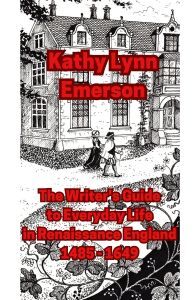
At the time, getting the contract to write this nonfiction book was a case of serendipity at work. I had written several novels set in England in the sixteenth and early seventeenth century and what is now the much improved and expanded A Who’s Who of Tudor Women had been published by a small scholarly press as Wives and Daughters: The Women of Tudor England. I was working on what would become Face Down in the Marrow-Bone Pie (the first book in my Face Down mystery series) when it struck me that, thanks to my research, I had enough material for another work of nonfiction. Since Writer’s Digest Books was had just brought out a guide to everyday life in Medieval England, I asked my then agent to find out if they were planning one for the Tudor period. It turned out that they were, although they wanted to include both the sixteenth and seventeenth centuries. And they wanted to refer to the period as Renaissance England. Personally, I thought that was a bit misleading. I couldn’t talk them out of it, but I did get them to concede that it would be a tough sell to include the last half of the seventeenth century. Executing your king and establishing Puritan rule kind of wipes out the chance for a flowering of the arts.
My timing was perfect. They liked the sample chapter I wrote (the one on seafaring), and the project went ahead. The finished manuscript was vetted by an “expert” somewhere, which was fine with me but a bit unnerving as I waited to see if he’d pick apart what I’d done. Then a hardcover edition came out in 1996. It stayed in print for years but eventually the rights reverted to me. I put up an e-book edition ages ago, back when e-books were first getting started. It still sells, although it’s really not much more than a glorified .pdf file. And then, of course, as I’ve mentioned in previous posts, I got the idea to self-publish a new, trade paperback edition to be available through print-on-demand. If you missed it, you can read about some of the challenges here
As for the content, that’s almost entirely the same. History does change with new discoveries, but not all that much, and the Everyday Life books were intended to be an introduction to research in the periods they covered. Do you want to know what people wore from 1485-1649? What they ate? How their houses were furnished? How long it took to travel from one place to another? Why the punishment for killing your husband was so much worse than if you just murdered some random stranger? All those answers and more are in The Writer’s Guide to Everyday Life in Renaissance England 1485-1649.
Special offer today: ask me a question in the comments section about life in England from 1485-1649 and I’ll post an answer.

Kathy Lynn Emerson/Kaitlyn Dunnett has had sixty-four books traditionally published and has self published others, including several children’s books. She won the Agatha Award and was an Anthony and Macavity finalist for best mystery nonfiction of 2008 for How to Write Killer Historical Mysteries and was an Agatha Award finalist in 2015 in the best mystery short story category. In 2023 she won the Lea Wait Award for “excellence and achievement” as a Maine writer from the Maine Writers and Publishers Alliance. She was the Malice Domestic Guest of Honor in 2014. She is currently working on creating new omnibus e-book editions of her backlist titles. She maintains websites at www.KaitlynDunnett.com and www.KathyLynnEmerson.com.
July 14, 2023
Weekend Update: July 15-16, 2023
 Next week at Maine Crime Writers there will be posts by Kate Flora (Monday), Kaitlyn Dunnett/Kathy Lynn Emerson (Tuesday) Sandra Neily (Thursday), and Dick Cass (Friday).
Next week at Maine Crime Writers there will be posts by Kate Flora (Monday), Kaitlyn Dunnett/Kathy Lynn Emerson (Tuesday) Sandra Neily (Thursday), and Dick Cass (Friday).
In the news department, here’s what’s happening with some of us who blog regularly at Maine Crime Writers:
 from Kathy Lynn Emerson: release date for the print-on-demand trade paperback reissue of The Writer’s Guide to Everyday Life in Renaissance England is Wednesday, July 19. Origially published in 1996 by Writer’s Digest Books as part of their Everyday Life series, it tells you pretty much everything you want to know about life in England under the Tudors and the first two Stuart kings. Since it would be hard to claim a renaissance was still in progress once the Puritans took over the country and beheaded their king, the details of day-to-day living apply to the years 1485 to 1649.
from Kathy Lynn Emerson: release date for the print-on-demand trade paperback reissue of The Writer’s Guide to Everyday Life in Renaissance England is Wednesday, July 19. Origially published in 1996 by Writer’s Digest Books as part of their Everyday Life series, it tells you pretty much everything you want to know about life in England under the Tudors and the first two Stuart kings. Since it would be hard to claim a renaissance was still in progress once the Puritans took over the country and beheaded their king, the details of day-to-day living apply to the years 1485 to 1649.
An invitation to readers of this blog: Do you have news relating to Maine, Crime, or Writing? We’d love to hear from you. Just comment below to share.
And a reminder: If your library, school, or organization is looking for a speaker, we are often available to talk about the writing process, research, where we get our ideas, and other mysteries of the business, along with the very popular “Making a Mystery” with audience participation, and “Casting Call: How We Staff Our Mysteries.” We also do programs on Zoom. Contact Kate Flora
Never Too Late?
I have spent much of my life not really planning anything, never focusing on the future. True, I was generally “looking forward,” but the path ahead was swathed in fog and fecklessness. Some might say this is why we have four kids, LOL. From 1974 to 1983, a new little Robinson was welcomed into the world every 2-3 years, and it was all I could do to manage the present and the laundry. Matching socks were an unusual occurrence.
Speaking of unusual, at the age of 83, Al Pacino has become a father again. Ditto for Robert DeNiro, at a sprightly 79. The Lord in his wisdom made motherhood a young woman’s matter, but fathers can be as ancient as Methuselah. I wonder if Al and Bob are pitching in and changing nappies. I am not quite as old as they, but still would not want to deal with dirty diapers again. Been there, definitely done that.
There are some advantages to growing older. I say “no” more often, and am more careful about what I choose to do. But there is also a sharper sense to not fritter away time or treasure. I’m cognizant that “looking forward” in my usual vague way might have limitations.
At this point, what am I waiting for? I’d better do what needs to be done. I have two completed books that are still looking for a home. I would hate to go to my Maker with them stuck on the hard drive, and the third one in the series is not going to finish itself.
Cartoonist William Steig started to write kids’ books at the age of 61, and went on to publish over 30 before he died at 95. Grandma Moses began to paint seriously at 78. She died at 101, with over 1500 works to her credit. The late Frank McCourt was 66 when his first book came out; Laura Ingalls Wilder was 65. Clearly, there’s no age limit to creativity.
But it’s true the words are getting a little more difficult to extract. The days of knocking out a book in three or four months—or even six—seem to be over. When my agent first signed me, she asked if I could write two books a year. I said yes, but might have to answer the question differently today, even if I have the luxury of unfettered time. I may not have a day job or referee squabbles or step on Legos at home anymore, but sometimes it’s hard to sit at the keyboard and ignore the bombardment from the outside world.
It can be…depressing. Draining. Almost dystopian, a veritable upside-down where every day is opposite day and truth is pretty tenuous. I do know how lucky I am that I’m not fleeing bombs or facing starvation. Or prison. But the 24/7 news cycle’s insanity and ignorance contaminate my delicate sensibilities. There are days when I identify with Jane Austen’s Mrs. Bennet and her famous nerves, and feel the need to take to my bed.
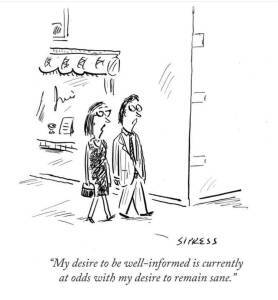
I’m easily distracted anyway. Recently, I stumbled across some information about the Farmington Historic District, and down the rabbit hole I went. Procrastinators R Us. Our house is within the area listed in the National Register of Historic Places. It was built in 1878 for Rev. Jonas Burnham, a minister and school principal, who tutored students to prepare them for college right up until a few days before he died at 91. The youngest of 9 children, he was a cabin boy in the War of 1812. After beating the British, he graduated from Bowdoin and taught in schools and academies throughout the state for 7 decades.
After an almost 50-year marriage, he was widowed…but within a year, he married again, the rascal. His much, much, much younger (52 years younger, to be exact) second wife Mary Lovina presented him with a brand-new new daughter in their brand-new house. Jonas was 80. So, he and Al and Bob are all members of the Doddering Dads’ Club.
Let’s hear it for making every day count! Age is just a number, right? Are you a planner in life/writing, or are you going with the flow? What do you want to do before it’s too late?
Lea Wait's Blog
- Lea Wait's profile
- 509 followers



